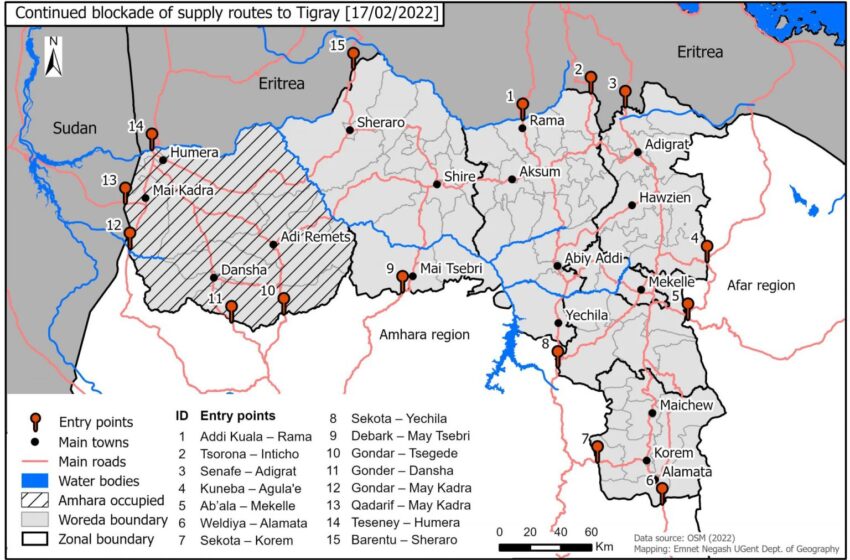
Fighting not the Reason Aid not Getting to Tigray
Source: Tghat
In a statement issued on 17 March 2022, the Ethiopian Ministry of Foreign Affairs (MFA) said “20 trucks loaded with food items and three trucks carrying fuel tankers have started moving from Semera to Mekelle”. International Crisis Group’s Ethiopia expert William Davison tweeted today that no Mekelle-bound truck had actually left Semera. As with previous statements regarding the delivery of aid to Tigray from the federal government, this reveals that the MFA’s statement was a lie.
According to the UN Office for the Coordination of Humanitarian Affairs (OCHA), no aid has been delivered to Tigray by road since mid-December.
What is stopping aid getting in?
Aid agencies estimate that about 100 trucks carrying food and non-food items should enter Tigray per day to satisfy the requirement. The requirement is dire – the BBC’s Reality Check reports that about half a million children do not have enough to eat, of whom about 115,000 are “severely malnourished”. Given that most places in Tigray are inaccessible and in a worse-off situation than those accessible, this estimate can only be conservative.
The routine explanation provided by the regime, helpfully perpetuated by different bodies in the illusory international community and excitable and credulous reporters, is that it could not deliver aid to Tigray because of a “fighting in the Abala district of the Afar region”. However, this explanation does not pass the test of basic scrutiny.
First, the various humanitarian organizations working on the ground are on record saying what is preventing them from delivering aid is a de facto blockade. Second aid was not getting into Tigray before the brief skirmish in Abala. Nor has any come through after. Third, the road through Abala is not the only route to Tigray. As can be seen in the map below, there are at least 14 other routes that lead to Tigray.
So the Regime’s lie that aid is not getting to Tigray because of a fight in Abala is a smokescreen for the actual reason aid has been blocked. The actual reason was stated by Abiy Ahmed following the routing of his forces from most of Tigray in June. In an “interview” broadcast on government-controlled media on 24 June 2021, he said his regime had learned an important lesson from the Derg Regime. He noted that the main reason the Derg had lost the war, against the Tigray People’s Liberation Front (TPLF) in 1991, was because “the Derg was generous enough to allow aid to get into Tigray”. The Prime Minister went on to claim that TPLF channeled this aid for military purposes and added that this mistake was not going to be repeated.
Leaving the absurdity of his argument to one side, he was publicly stating his regime’s policy towards Tigray. He was promulgating the de facto blockade. Further elaborating this cynical and deeply cruel philosophy, he gave an analogy of an unethical football player and a lenient referee — he said a player can deploy anything, including life-threatening tackles, to win a game as long as he is not caught by a lenient referee. His regime is the player. The lenient referee is the international community.
The President of the Afar Region, Awol Arba, a key ally of Abiy, did not feel the need to speak in such roundabout terms or to utilize football analogies. He recently stated bluntly that:
I will never let a single bread get into Tigray
Awol Arba, President of the Afar Retion
Therefore, there is no doubt at all that the reason aid is not getting to Tigray is because of the de facto blockade.
Why does the regime continue to give false promises that a convoy is on the way to Tigray or that it is playing a constructive role? It wants to seem to be doing its best to deliver aid without actually delivering aid. This helps it achieve both its goal of starving Tigray into submission and avoiding potential sanctions or condemnation from the international community.
It is a formula that has been working perfectly well. Every time the regime is pressured to deliver aid to Tigray, all it needs to do is issue a statement saying that aid convoy is on the way. All the while ensuring that the aid does not actually get delivered. Sometimes it is bureaucratic red-tape. Sometimes it is by intimidating and assaulting drivers. Sometimes it is by unleashing vigilantes to “attack” trucks. And as though by decree, all media outlets and bodies report on the regime’s promise that aid is on the way but none of them has any interest in following the story up.
A serious reporter would ask: “If vigilantes or regional forces are stopping the trucks, why does the Government not condemn or reprimand them?” Or “why not try other routes?” Or “why not call on the international community to increase the number of flights?” Surely, a government that has the interest of the people of Tigray at heart would try its best to deliver aid. Sadly, seriousness or professional integrity are in short supply when it comes to reporting about Tigray. Parroting the regime’s lines is what passes for serious commentary and journalism.
Meanwhile, the children of Tigray continue to starve. They continue to die in darkness. Neither the false promises nor the enthusiastic reporting of them can save them.
